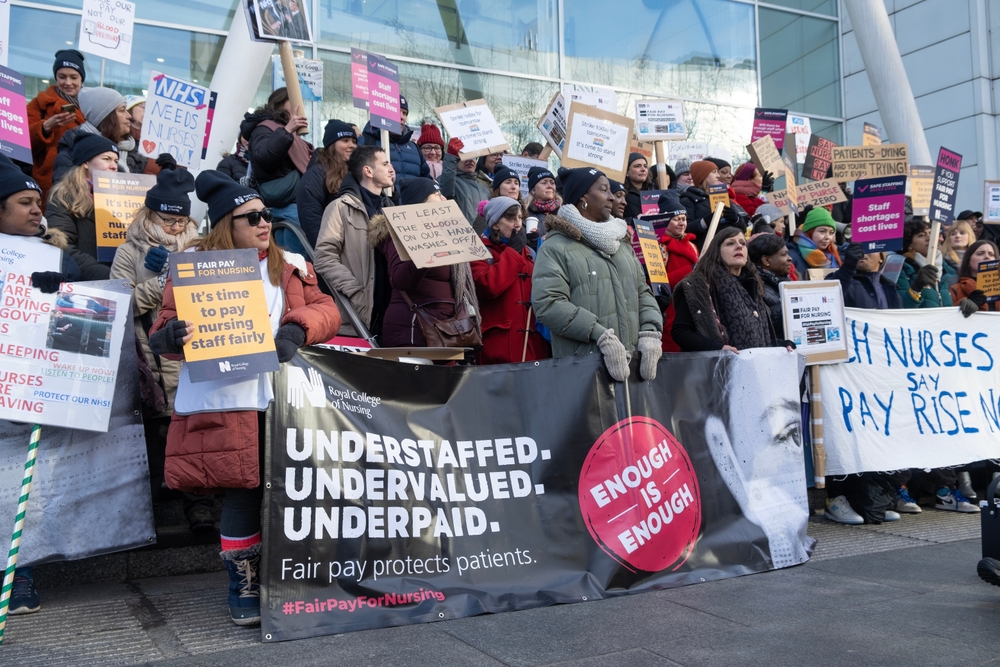
Industrial action by healthcare workers and the impact on general practice
Nurses, ambulance staff, physiotherapists and midwives employed by the NHS are taking part in widespread industrial action this winter as disputes over 2022/23 pay awards between health unions and the government remain unresolved.
Although patients have been told that GP services are not impacted because general practice nurses are not on strike, the reality is that the postponement of thousands of secondary healthcare appointments impacts patients and adds to the backlog that is driving up GP workloads.
With GP surgeries already facing unprecedented demand, how should GPs respond to the strike action while upholding their professional responsibilities and mitigating risks to patients and GP staff?
Industrial action by NHS staff
Health unions representing NHS workers employed on Agenda for Change terms are demanding pay rises above inflation, citing real-terms cuts to income over the past decade that are driving staff to leave the NHS. However, the UK government has declined to open formal pay negotiations and union members voted for strike action.
Strikes by NHS workers in England, Wales, and Northern Ireland, impacting routine care, will continue into February and March. Not all hospitals and regions will be affected. For updated information and locations of strikes, visit:
- Nursing staff: RCN (next strikes on 6 and 7 February 2023)
- Ambulance staff:
- Physiotherapists: Chartered Society of Physiotherapists (next strikes on 9 February)
- Midwives: Royal College of Midwives (strikes in Wales on 7 February)
- NHS England: Information for the public on industrial action
Possible future action
RCN Scotland has paused strike action as further pay negotiations with the Scottish government were agreed in January. However, the possibility of strikes by nurses in Scotland remains if the talks do not conclude successfully by the end of February.
Meanwhile, the ongoing BMA ballot of junior doctors, including GP trainees, closes on 20 February. If members vote in favour, NHS trusts and GP practices will need to prepare for a three-day strike in March, during which junior doctors will not provide emergency care.
GP leaders have also warned that GPs should be prepared to take industrial action, if necessary, over contract negotiations for 2023/24.
GPs urged to show solidarity with colleagues on strike
The BMA has urged doctors across the UK to support their colleagues taking industrial action. The organisation has provided advice to members on how to show moral support, without compromising their own professional responsibilities.
The BMA also warned GPs to ignore calls from NHS England to step in for healthcare staff taking part in strikes. This followed an urgent request, sent by NHS England to GP practices and other primary care organisations, for GPs to cover ambulance staff during their industrial action in December.
While GPs have a professional obligation to help if emergencies arise in a clinical or community setting, the BMA said it expected that the scope for emergencies would be limited on strike days as the action affects only non-urgent and elective activity.
Dr Kieran Sharrock, BMA GP committee deputy chair, said: “We are supportive of healthcare staff who feel they are left with no choice but to strike and as the BMA we would not recommend our members to undertake work which would undermine the strike action of another staff group.”
He also cautioned: “If we were to significantly divert the GP workforce to support them, then we risk putting our patients at harm, not to mention increase their waiting times, and could harm the wellbeing of already overstretched general practice teams.”
Dealing with extreme demand in general practice
GPs have been generally supportive of the strike action, despite acknowledging that it drives up GP workloads by increasing the backlog of patients waiting for secondary care.
Even before the strikes, GPs were delivering a record number of appointments and many believe the workload exceeds safe levels. To continue to deliver patient care safely, GPs must be mindful of their own wellbeing and that of their colleagues, making use of alternative resources wherever possible.
The BMA recommends that “practices take urgent action to move towards safe consultation numbers per day.” The European Union of General Practitioners and BMA put this at a maximum of 25 contacts per day, whereas GPs in England see on average 37 patients daily.
The BMA advises: “Excess demand beyond safe levels should be directed to NHS 111, extended access hubs, or other providers.” The use of a waiting list for patients with non-urgent problems is also recommended, to avoid exceeding safe capacity.
If you have concerns about the impact of NHS industrial action on patient or staff wellbeing, or need advice about your responsibilities on strike days, please contact us at Medical Defense Society.

Recent Comments